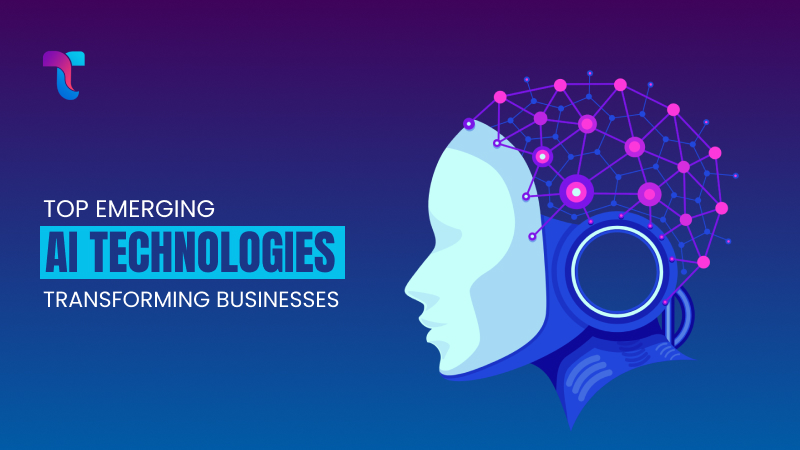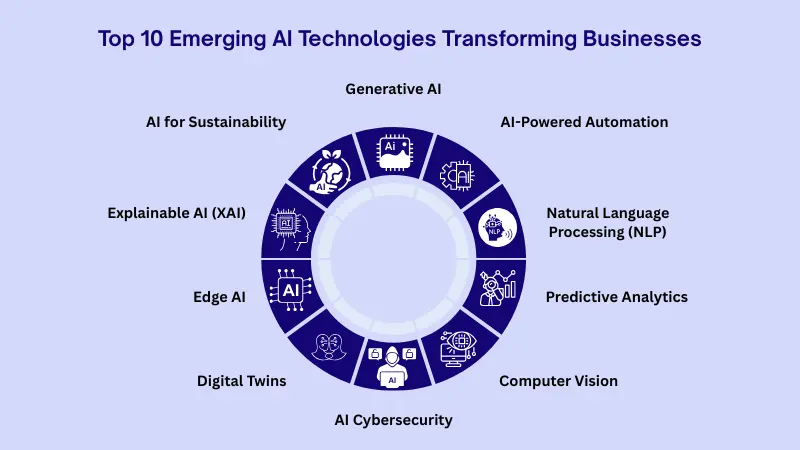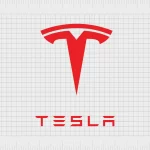AI is now a reality, not just a sci-fi fantasy. It’s here, it’s real, and it’s shaking things up in a big way. From how we shop to how decisions are made in boardrooms, AI is transforming the business world.
But you know what? It’s not just about chatbots and automation anymore. A new wave of AI technologies is emerging, which is smarter, faster, and more adaptable than ever before.
And the businesses that are paying attention? They are gaining a serious edge.
So what are these next-gen tools? What’s hype, and what’s actually driving real results?
In this blog, we’ll be talking about next-gen AI technologies that are redefining how businesses operate. This list will give you a sneak peek at the future.
Alright, let’s dive right in!
Why AI Is the Game-Changer for Modern Businesses
AI drives innovation, efficiency, and growth in today’s competitive business environment. AI is transforming businesses through AI Development that automates routine tasks and delivers personalized experiences.
This technology enables companies to make quicker decisions, cut costs, and discover new revenue opportunities.
Here are some key statistics that highlight the transformative impact of AI in 2025:
- 78% of organizations globally are using AI in at least one business function. And you might be shocked that it is a jump from just 55% in 2024.
- 82% of companies are either actively using or exploring AI. This indicates that AI has gone mainstream, not just in innovation labs.
- Generative AI (GenAI) usage rose from 33% in 2023 to 71% in 2025, especially in content creation, customer support, and coding.
- As per the latest research, small and medium businesses (SMBs) are catching up; somewhere around 78% now integrate AI in core operations, from CRM to logistics.
- The global AI market is expected to hit $826.7 billion by 2030, which shows growing enterprise investment and integration.
Top 10 Emerging AI Technologies Transforming Businesses
Here is an overview of the top AI technologies that are influencing the future of businesses in 2025 and beyond:
Generative AI
Basically, Generative AI refers to algorithms that create new content like text, images, videos, or code. These models are trained on a ton of data, and they can whip up responses that feel pretty close to human creativity.
Generative AI tools are transforming how businesses approach content creation, marketing, product design, and customer service. It allows for quicker, scalable, and more personalized results in writing blog posts, ad copy, designing visuals, and powering AI bots.
Examples: ChatGPT (OpenAI), Midjourney, DALL·E, Gemini (Google)
AI-Powered Automation
Hyperautomation combines the power of artificial intelligence with Robotic Process Automation (RPA) to effectively manage complex business tasks across various departments.
It goes beyond simple task automation by integrating systems, data, and decisions. AI automation software helps companies to streamline operations in areas like human resources, finance, procurement, and supply chain management. This helps save time and cuts down on mistakes people might make.
Examples: UiPath, Automation Anywhere, Blue Prism
Natural Language Processing (NLP)
Natural Language Processing (NLP) allows computers to understand and respond to both written and spoken human language.
Indeed, NLP and chatbots walk hand-in-hand. Plus, it’s basically what powers voice assistants, tools that figure out how people are feeling, and automated customer support systems. It helps businesses improve customer experience, analyze feedback, and enable voice-based interactions in apps and devices.
Examples: OpenAI APIs, Google Bard, Amazon Lex
Predictive Analytics
Predictive analytics uses AI and machine learning to analyze historical data and forecast future outcomes, trends, and behaviors.
Companies use predictive analytics for sales forecasting, identifying customer churn, managing inventory, assessing risk, and personalizing marketing strategies. It turns data into actionable insights that support smarter decision-making.
Examples: Salesforce Einstein, IBM Watson Analytics
Computer Vision
Computer vision empowers machines to “see” and comprehend images and videos. It helps in recognizing objects, patterns, and even actions.
This technology is commonly used for quality inspection in manufacturing, facial recognition for security, AR/VR in retail, and diagnostic imaging in healthcare. Computer vision is a game-changer for businesses because it helps them collect and use visual data right away.
Examples: Tesla Autopilot, Amazon Go stores, Meta’s AR research
AI Cybersecurity
AI cybersecurity applications use machine learning to identify, prevent, and respond to cyber threats more quickly and accurately than traditional systems.
It helps businesses identify vulnerabilities, detect unusual behavior, block potential breaches, and automate incident response, which plays an important role in a landscape of growing digital threats.
Examples: Darktrace, CrowdStrike, SentinelOne
Digital Twins
A digital twin is a virtual replica of a physical asset, system, or process. It is further enhanced with real-time data and AI to simulate performance and predict outcomes.
Digital twins and IoT (Internet of Things) are used in manufacturing, engineering, and logistics to optimize performance, prevent failures, and improve design. For example, manufacturers can simulate equipment behavior before making physical changes.
Examples: Siemens, GE, NVIDIA Omniverse
Edge AI
Edge AI processes data on local devices such as sensors or smartphones instead of sending it to the cloud. This results in faster decisions and greater data privacy.
Basically, edge AI devices power real-time operations in industries like automotive, smart factories, and IoT ecosystems. It is one of the best emerging AI technologies to watch in 2025 as it helps businesses benefit from lower latency, reduced bandwidth costs, and improved data security.
Examples: Qualcomm AI Engine, NVIDIA Jetson
Explainable AI (XAI)
One of the latest advancements in AI is Explainable AI. It shows users how artificial intelligence makes choices, which builds trust, especially in critical situations.
In industries such as finance, healthcare, and law, where regulations require a high level of accountability, XAI helps businesses guarantee that AI-driven decisions are ethical, compliant, and transparent to all stakeholders.
Examples: Google’s TCAV, IBM’s Explainability 360 Toolkit
AI for Sustainability
AI is becoming more important in tackling environmental issues. It’s helping companies keep track of their energy use, cut down on emissions, and make their operations greener.
Sustainable AI solutions help companies focus on energy efficiency, climate change modeling, and carbon credit tokenization, supporting their sustainability and ESG goals.
Examples: Microsoft AI for Earth, ClimateAI
Examples of AI Innovation in Real-World Business
AI is being used by global brands to work and see great results. Here are a few examples of how artificial intelligence is being used in real-world businesses around the world:
Amazon
Amazon uses the power of AI-driven logistics to enhance delivery routes, streamline warehouse operations, and manage inventory efficiently on a large scale. Moreover, its AI and machine learning-based personalized recommendation engine plays a crucial role in boosting customer engagement and driving sales.
Tesla
Tesla is using computer vision and edge AI in its cars to help them spot objects, recognize lanes, and drive on their own in real time. This tech is really important for making their self-driving features work and keeping everything safe.
Unilever
Unilever uses predictive analytics to improve its supply chain forecasting and inventory planning across global markets. The company has improved efficiency and reduced waste by analyzing real-time data, meeting both business and sustainability goals.
Google DeepMind
DeepMind utilizes the power of AI to promote sustainability, particularly for the optimization of energy consumption in Google’s data centers. Using machine learning, they reduced cooling energy consumption by up to 40%, which shows how AI technologies are transforming modern business and can further reduce environmental impact while cutting costs.
Wrapping Up
Well, there you go!
Businesses across the world are already using AI to witness massive wins. And if you are thinking it’s only for tech giants, think again. As the stats show, even small and mid-sized businesses are diving in and reaping the benefits.
Where does your business stand in this shift?
If you are ready to explore what AI can do for you, no matter whether you are just starting out or looking to scale, Technoloader is here to help. We make AI simple, strategic, and tailored to your business goals.
Let’s build the future together!
FAQs
What industries are most impacted by AI?
AI is changing industries such as finance, healthcare, retail, logistics, education, manufacturing, and marketing. Every industry can benefit from AI’s ability to analyze data, reduce costs, and improve customer experiences.
What is the impact of AI on small and medium businesses?
AI is having a positive impact on small and medium businesses. Many AI tools for companies are becoming more accessible and affordable, which can help them automate repetitive tasks, enhance customer service with chatbots, personalize marketing, improve decision-making with predictive analytics, and optimize operations.
How secure is AI for business operations?
AI makes security better by spotting cyber threats and scams way quicker than older systems. However, businesses must ensure ethical AI use, data privacy, and human oversight to maintain a safe digital environment.
What is the future of AI in business?
The future of AI in business looks really bright! By 2030, AI is expected to drive a lot of major business activities around the world. This should help companies become smarter, more flexible, and better for the environment.
How can businesses start implementing AI today?
The first tip is to start small. Identify areas such as marketing automation, customer service, or analytics that can benefit from AI. Also, use affordable tools or partner with an AI development company to build customized solutions tailored to your business goals.
What are the top artificial intelligence tools for enterprises?
Top AI tools used by businesses today include IBM Watson, Google Cloud AI, Microsoft Azure AI, Salesforce Einstein, ChatGPT, UiPath, and DataRobot. These tools help businesses automate tasks, speed up data analysis, enhance customer engagement, and boost operational efficiency.
 +91 7014607737
+91 7014607737
 info@technoloader.com
info@technoloader.com








